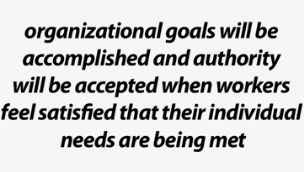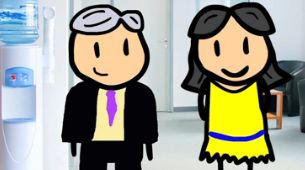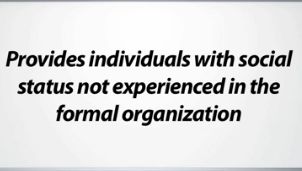Chester Barnard: Informal Organizations and Acceptance Theory
After you watch the video and know the material, click HERE for the quiz.
Chester Barnard believed that formal organizations are made up of informal groups. These informal groups evolve to become the informal organization. The group's beliefs and values establish the organizational culture and determine, to a large extent, formal acceptance of authority.
Acceptance Theory to Authority
Management theorist Chester Barnard believed organizations need to be both effective and efficient. Effective means meeting organizational goals in a timely way. Efficient, in his opinion, means the degree to which the organization can satisfy the motives of its employees. In other words, the organizational goals will be accomplished and authority will be accepted when workers feel satisfied that their individual needs are being met. This is known as the acceptance theory of authority.
 |
Acceptance theory of authority states that a manager's authority rests on workers' acceptance of his right to give orders and to expect compliance. Workers have to believe that the manager can legitimately give orders and there is a legitimate expectation that the orders will be carried out. There are a few reasons for this expectation:
- Workers will be rewarded for compliance
- There will be discipline for non-compliance
- Workers respect the manager for his experience
Informal and Formal Organizations
Organizations are made up of groups of individual workers. Naturally, these individual workers form informal social groups that become the informal organization. The informal organization exists within a larger formal organization. Let's take a look at Cheap's Variety Store to gain a better understanding of how informal groups and acceptance theory work together.
Cheap's management likes to keep things professional at all times. There is a hierarchy or chain of command for each department. Formal organizations operate under a set of rules and policies designed to carry out the organizational purpose, like meeting financial and production goals. A formal management-employee relationship dictated by hierarchy exists. Work flows from top-management to workers through hierarchical channels.
 |
At Cheap's, the chain of command starts with the general manager, then department managers, and then the salespeople. Cheap's Variety Store houses several departments. Each department is staffed with a manager and a few salespeople. Managers assign tasks to employees, and it is expected that employees will complete the work. Some managers reward employees for accomplishing all of their goals by giving them extra time off or an extra break. Other managers are less generous with rewards. Some even threaten punishment for a less-than-productive day.
Randy, the shoe department manager, likes to reward employees by giving them lots of praise for a job well done. He also shares sales goals and outcomes with the staff so they understand the reason for special promotions. This makes his employees more apt to accept the tasks he delegates. They enjoy working with him because he communicates the purpose of their work and includes them in the celebration when the department hits their goals.
It is not uncommon to see a group of cosmetic sales girls hanging around the mirror chatting away, testing the newest lipsticks while work piles up and shelves are empty. But who can blame them. Liza, their manager, is not very qualified to manage the department. She is very young, nearly half the age of the others, and has no retail experience. She doesn't even have a knack for applying make-up.
 |
Sales goals are never shared with the girls. It's just work, work, work! When the girls ask Liza about a new sales promotion, Liza just tells them to get back to work. Liza requires the girls to move the displays around the department every three hours. When the girls question why, Liza dismisses their concerns completely. As a result, work doesn't get done and sales are very low. There is always conflict in cosmetics.
Cheap's allows managers to direct work any way they see fit. But as we witnessed in the cosmetics department, not all employees perform their jobs well. Some do the work while others loaf around.
The informal organization is structured much differently. It is the personal contacts and interactions between workers that form into small groups. These informal groups of workers form their own organization within the larger organization and have a powerful impact on the acceptance of formal authority.
Water Cooler Culture
Informal organizations exist everywhere on the job. When workers hang around the water cooler to talk about last night's big game or where to go to lunch, they are really doing much more than chit-chatting. They are bonding together to form and sustain the informal organization.
 |
The organizational culture evolves from the beliefs and values the small informal groups cherish. This social interaction over time forms into cohesive relationships necessary for people to work together. And it creates an independence from the formal authority because the informal organization is not governed by rules and policies.
The break room is the place where salespeople at Cheap's go to talk about work. The shoe salespeople talk about their sales goals and share ideas. The cosmetic girls talk about Liza and her poor management skills. Each conversation the groups have builds a strong union between each of the salespeople.
This water cooler culture is necessary. Its function can be beneficial to the formal organization in that it:
- Provides individuals with social status not experienced in the formal organization
- Promotes communication between group members
- Influences and regulates behavior inside and outside the group
- Motivates people to want to work together
- Leads to new and innovative idea sharing
On the other hand, it can be damaging to the formal organization if there is conflict between the two. Individual loyalty to the informal group may be stronger than the loyalty felt towards the formal organization, making it difficult to accept formal authority.
 |
Liza's cosmetic girls are not so happy with their jobs. As tensions increased in cosmetics, the girls formed a stronger bond. It became so difficult to work in the department that customers felt uncomfortable getting a beauty treatment. Lipsticks were scattered everywhere. The department was a mess. There was even talk of a walk-out!
The informal group's beliefs, habits, and attitudes can become so cohesive that it operates like a formal organization. The unified group of individuals, who share the same opinions, bond. Their influence may spread amongst members of other informal groups, and their conformity is crucial.
Informal Groups and Acceptance of Authority
Let's take another look at the informal group. The informal group bands together for social interaction. There is no hierarchy. Group members are free to express their thoughts and ideas without fear of punishment. Reward comes in the form of group acceptance. It feels good to be part of a group.
Working at Cheap's makes the employees feel special, even if there is conflict between management and a few salespeople. They feel part of something special and treat each other like family. Cheap's salespeople are free to make choices. What to eat for lunch, what to wear to work, whom to talk about. None of this is governed by a formal policy. The informal group is personal, and the break room is a safe haven for salespeople to chat about anything they want.
In the formal organization, every person has a role. These roles are static and don't change. Faces may change, but roles remain constant. Management's role is to delegate tasks, and workers are expected to carry them out. Employees are not free to pick and choose from a list of tasks. Employees have little to say in what they are assigned to do. Compliance brings reward, while non-compliance begets punishment. Management's authority controls them. The formal organization depersonalizes workers.
 |
Here is the connection: Informal groups can wreak havoc on management, but they can also influence others in positive ways. Good relationships with management that include mutual respect and trust, clear communication, and an understanding of the purpose of their work make the informal group more apt to accept the formal authority.
Lesson Summary
In a nutshell, Chester Barnard believed that formal organizations are made up of informal groups. These informal groups evolve to become the informal organization. The group's beliefs and values establish the organizational culture and determine, to a large extent, the formal acceptance of authority.
Formal organizations operate under a set of rules and policies designed to carry out the organization's purpose, like meeting financial and production goals, while informal groups involve personal contact and interactions between workers. These informal groups of workers form their own organization within the larger organization and have a powerful impact on the acceptance of formal authority.
The acceptance theory of authority states that a manager's authority rests on workers' acceptance of his right to give orders and to expect compliance. Informal groups will accept management's orders when rewards are given or to avoid punishment when there is respect and trust for management's authority and it's legitimate.